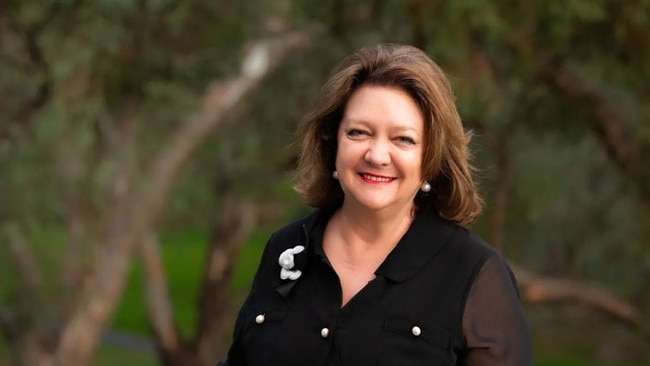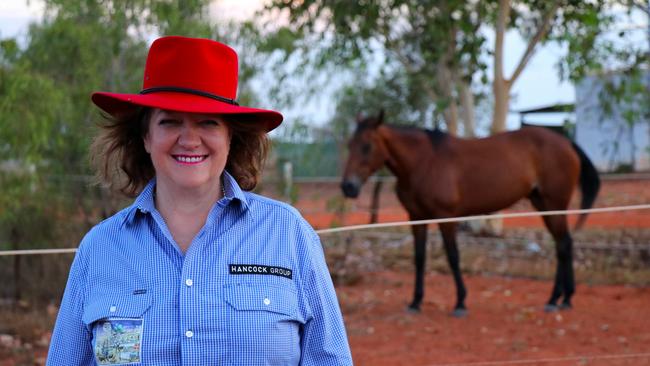Profits fall for Gina Rinehart’s Hancock Prospecting but they still top $5bn
The billionaire’s mining and investment business has now become one of the biggest privately-owned companies in Australian history, despite a drop in profits.

Gina Rinehart’s Hancock Prospecting mining giant has delivered the biggest profit for a locally-owned private company this year, shipping record amounts of iron ore overseas.
But the company’s profit and revenue both fell as lower iron ore prices and rising costs cut into Hancock’s earnings, which the company also blamed on slow planning approvals and a regulatory environment it said is making it difficult to undertake new projects.
Hancock made a $5.04bn net profit from $13.2bn revenue for the year to June 30, the company said, compared to a $5.8bn net profit and $14.6bn revenue in 2022.
The company’s 2023 result includes big profits for Mrs Rinehart’s mining operations and investments such as a stake in rural holding Australian Outback Beef.
The profit is several times larger than any other Australian-owned private company, and comes as Mrs Rinehart once again scours the market for acquisitions.
Hancock built a strategic 18 per cent stake in listed lithium miner Azure Minerals last week, worth about $285m, only weeks after Hancock spent about $1.3bn buying shares in another lithium play in Liontown Resources.

While Australian Outback Beef, which Hancock owns with Chinese joint venture partner Shanghai CRED Real Estate, delivered a $84.8m net profit, including the sale of some cattle stations during the year it is Hancock’s vast mining assets that unpin its financial result.
It has a majority shareholding in the huge Roy Hill iron ore mine, which shipped a record 63.3m tonnes of iron ore this year and delivered a $2.7bn net profit that led to Hancock sharing in $3.25bn in dividends.
The company’s four joint venture Hope Downs iron ore mines shipped 46.5 million tonnes, and contributed net profit after tax of more than $1.3bn to Hancock’s results for the year
Subsidiary Atlas Iron shipped 8.9 million tonnes of iron ore from its Mt Webber, Sanjiv Ridge and Miralga mines, and delivered a net profit after tax of $401 million.
Hancock is undertaking exploration, drilling and evaluation of various iron ore projects with approvals progressing for its Mulga Downs project, but said generally it had run into headwinds due to approval timeline delays and regulatory uncertainty.
“The current policy environment, duplication of processes, overreach from all departments and delays to approvals is negatively impacting new investment into the mining industry and is reducing Australia’s competitiveness in the international resource sector,” Hancock said in a statement.
It added that the US, Canada and Europe, which have higher cost environments than developing countries, are – in contrast to Australia – providing “significant” support for mining projects, particularly downstream processing for future metals.
“Australia’s competitiveness when it comes to value add continues to decline against other developed economies and its higher cost environment is increasingly uncompetitive against developing economies,” Hancock said.
“Australia can and needs to do much more to reduce regulatory burdens and make investment welcome and development easier for its essential resources and related industries.”
Hancock paid $3.7bn in Australian federal and state taxes during the 2023 financial year, the company said.
“Under its dedicated leadership, Hancock is the most successful private company in Australia’s history,” it said in a statement. “Internationally, it is also one of the most successful private mining companies in the world.”
The company is majority owned by Mrs Rinehart, with her four children having a minority shareholding via The Hope Margaret Hancock Trust that owns almost 24 per cent of the company.
Hancock provided for about $781m in dividend payments for Mrs Rinehart and her children on its balance sheet for the 2022 financial year.
The company now has about $38bn in assets on its balance sheet, and only $363m borrowings.


To join the conversation, please log in. Don't have an account? Register
Join the conversation, you are commenting as Logout